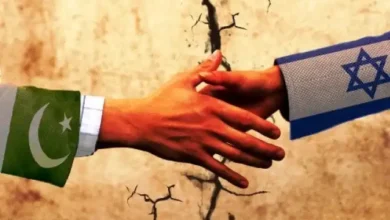How Global Conflicts Serve Economic Interests of Nations
War has rarely been fought for flags, honor, or faith alone throughout history. The fact that conflict is frequently an economic tactic disguised in patriotic rhetoric is a continuous reality that lies beneath the surface of heroic narratives and ideological conflicts.


How Global Conflicts Serve Economic Interests of Nations
By
Khurram Niaz
War has rarely been fought for flags, honor, or faith alone throughout history. The fact that
conflict is frequently an economic tactic disguised in patriotic rhetoric is a continuous reality
that lies beneath the surface of heroic narratives and ideological conflicts. Nations have
fought to not only win but also to enrich themselves, as seen by the conquests of ancient
empires and the colonial endeavors of European powers.
The British colonized to control trade routes and exploit raw minerals, whereas the Roman
Empire grew in search of tribute and slaves. Even the religiously motivated Crusades created
commercial routes between the East and the West. Swords and soldiers have always been
silently accompanied by land, labor, and booty.
This economic justification is still valid in more recent times. Profitable motivations, such as
access to oil, rare minerals, or geopolitical influence that immediately translates into
financial benefit, are sometimes hidden behind wars marketed to the public as conflicts for
freedom or security. The prospect of profit drives the war machine ahead while
governments talk about democracy and defense.
It's become more difficult to overlook the question of who really gains when the bombs
start dropping as long as the world's conflicts continue to rage across continents.
Alongside the economic recovery following World War II, a new power emerged: the
military-industrial complex. President Eisenhower issued a warning against the expanding
cooperation between governments, the military, and the defense sector. This strong
network fuels ongoing militarization and frequently puts war readiness ahead of peace.
It is currently a trillion-dollar worldwide sector that advances military technology and
supports millions of jobs. The steady inflow of public cash into commercial defense
companies drives the development of weaponry such as hypersonic missiles and stealth
drones. Behind the scenes, lobbyists, contractors, and think tanks create policies that
conflate corporate profit with the interests of the country.
One example of this trend is the U.S. Department of Defense. Its budget, which topped $700
billion during the wars in Iraq and Afghanistan, enriched firms like Lockheed Martin and
Raytheon, not only for weapons but also for logistics and reconstruction.
According to this idea, war turns into a business. Profits increase with the length of a fight,
not for soldiers but for executives in far-off boardrooms.
Although war can be terrible for both governments and civilians, it is profitable for the
global arms industry. The connection between instability and the selling of guns is
intentional and well-established; it is neither coincidental nor concealed. Wars don't merely
break out in today's geopolitical environment; they are frequently maintained by the steady
flow of munitions from strong countries to unstable areas.
Global Conflicts
The leading arms exporters control a multibillion-dollar market, with the United States at
the top and Russia, France, and China in close pursuit. Their clients are strategic partners
whose volatility guarantees repeat business rather than always being loyal allies. From the
Middle East's deserts to Africa's jungles and Asia's mountains, conflict areas are also
commercial battlegrounds where power is gauged by defense contracts as much as
diplomacy. Even though world leaders frequently advocate for peace, their countries frequently make
agreements that stoke the very conflicts they denounce. Few people are brave enough to
question this double standard: Precision missiles were sent to Saudi Arabia, armed drones
to Ukraine, and F-16s to Taiwan. Irony grows in the present Iran-Israel conflict as Iran uses
Chinese air defense systems and Russian drones to resist Israel's attack, which is fueled by
American-made weapons. Every transaction is made in the guise of sovereignty or deterrence, but the end effect is frequently escalation. Peace is a good thing in this conflict economy, but selling weapons is a
reliable source of revenue. Profiteers in the Shadows: Some specific groups silently rejoice every time a conflict breaks out, while other countries lament the deaths and calculate the cost of reconstruction. These are the private security companies, defense contractors, and multinational arms manufacturers that work behind
the scenes and make money in the background with each missile fired. In defense circles, companies like Raytheon and Lockheed Martin are well-known, and their financial sheets grow after each significant fight. As soon as hostilities start, these companies' stock values usually rise. Investors see war as a chance for long-term rehabilitation agreements, government contracts, and increased demand. Simultaneously,
companies such as Halliburton have prospered not from the actual fighting but rather from
the aftermath: the profitable industry of reconstruction, frequently with no supervision and
maximal political clout. By providing outsourced combat services in exchange for mining rights, political clout, or
actual money, private military firms like Russia's Wagner Group have expanded the profit
model. Skirmishes abroad have also evolved into instruments of economic realignment.
China's Chengdu Aircraft Corporation saw a spike in profits after Pakistan displayed its J-10C
fighters, while France's Dassault Aviation, the manufacturer of Rafale jets, reported losses
during the brief escalation of tensions between India and Pakistan. For these actors, war is a strategy rather than a tragedy. Their part in international conflicts
is frequently obscured by defense narratives and nationalistic slogans. However, their
influence is evident: when diplomacy fails and the guns are drawn, they stand to benefit the
most. Wars unsettle markets in addition to changing boundaries. Global commodity prices,
especially those of oil, gas, and gold, are frequently affected by every missile fired in a
combat zone. Financial institutions and traders’ profit from the volatility since they are
constantly keeping a close eye on geopolitical tension. Energy speculators and hedge funds can profit from overnight spikes caused by events like a military standoff in the Strait of
Hormuz, a drone strike on a refinery, or a blockade in the Red Sea. In times of conflict, vital maritime lanes and energy corridors turn into highly valuable resources. They are bargaining chips used by governments to acquire political influence by
threatening to cut off supply lines or reroute shipments. Fossil fuels turn into a weapon in
certain situations, not merely a resource. This economic chess also involves sanctions. Instead of punishing, they frequently realign trade flows. While some nations—typically allies or neutral intermediaries—absorb the
demand and profit, others crumble under strain. For example, oil prices surged worldwide
during the conflict between Russia and Ukraine. Energy-rich countries like Saudi Arabia
gained clout as Western economies scurried, and new trade lines opened to allow for
banned Russian petroleum. Global food insecurity was also made visible by shortages of
wheat and fertilizer, turning agriculture into yet another front in this economic conflict. When handled properly, turmoil can be turned into money. Many battles in the modern world are waged indirectly through proxy wars, a strategy employed by strong states to affect world events without resorting to outright armed
action. These conflicts entail providing financial support to armed organizations, aiding
foreign regimes, or inciting uprisings in the name of regional stability or humanitarian relief. Examples include Iran's support for the Houthis in Yemen, Russia's early assistance to
separatists in Ukraine's Donbas region, and the United States' efforts in Latin America during
the Cold War. In each instance, conflict is prolonged and faraway nations can maintain
control through financial and military support. Such operations transfer sovereignty from local players to foreign supporters, frequently under the pretext of "strategic partnerships." With employment and governance linked to foreign-backed governments or proxy militias, economies become more reliant on handouts
from outside sources. Through proxy conflicts, powerful nations can test weaponry, expand their influence, and
alter geopolitical environments without actually starting a war. A more subdued and
protracted type of battle with profound political and economic ramifications is the end
result. A new form of opportunity arises after a battle, one that is clad in contracts, cement, and
consulting rather than camouflage. Global firms, financial institutions, and foreign
governments seeking to convert destruction into development cash find that the post-war
era, sometimes known as "recovery," is a treasure trove. Under the guise of rebuilding,
foreign finance enters, the local authority is weakened, and infrastructure demands are
enormous. The typical players quickly appear: donor governments, the World Bank, and the IMF
promise billions of dollars in help, frequently subject to conditions that alter local
economies. While domestic industries are marginalized or absorbed, Western construction
companies, energy behemoths, and security contractors control tenders. Cities devastated
by war become fresh markets for private security, real estate, oil extraction, and
telecommunications. However, there is another level of control hidden beneath this support façade. Rebuilding-
related loans have interest rates and structural requirements that bind nations to decades
of repayment. Profitable resource contracts are surreptitiously transferred, and public
assets are privatized. In actuality, economic dependence replaces physical employment. Once signs of loss, the war's ruins now serve as assets in the new world order.
Reconstruction is viewed by those who write the checks as a long-term commercial strategy rather than a humanitarian endeavor.
Global Conflicts




